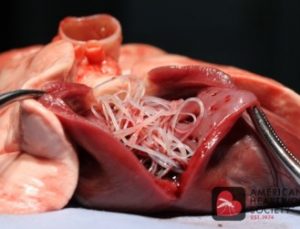Heartworm Disease

Heartworm disease is a serious and potentially fatal condition caused by parasitic worms living in the arteries of the lungs and occasionally in the right side of the heart of dogs, cats and other species of mammals, including wolves, foxes, ferrets, sea lions and (in rare instances) humans. Dogs or other animals harboring adult worms are the recognized reservoir of heartworm infection. The disease is spread by mosquitoes that become infected with microfilariae while taking a blood meal from an infected dog. Within the mosquito, the microfilariae mature into the infective larval stage. When the mosquito then bites another dog, cat, or susceptible animal, the larvae are deposited on the skin and actively migrate into the new host.
In most dogs, the heart and lungs are the major organs affected by heartworms with varying degrees of clinical signs including cough, exercise intolerance, difficulty breathing, and finally death.
The American Heartworm Society (AHS) released new recommendations in February, 2010 stating that annual testing and year round preventative are important for the health of pets.
Testing can be done at your vet using a simple blood test. Heartworm negative dogs should be kept on monthly preventatives such as Sentinel, Heartgard Plus, Interceptor, and Revolution. All monthly preventatives are safe* and very effective when given consistently. Most also help prevent intestinal parasites.
Talk to your vet regarding the right preventative for your dog.
*Currently, there is only one medication (Immiticide) available or treatment of the disease. While it is
usually affective, it is not without risk. Dogs can have reactions to the medication and the potential of pulmonary embolism is very high; all post treatment dogs must be kept quiet and confined for several months. Due to this risk, the AHS maintains that prevention is the best and healthiest choice for our pets.
For more detailed information, please go to these sites: http://www.heartwormsociety.org or http://www.veterinarypartner.com
Image source: https://baysideanimal.com/pet-health/heartworm-disease/

